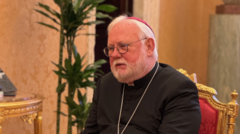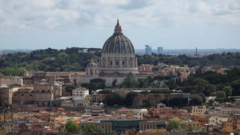The Israeli government's muted response to Pope Francis's death, including a delayed and impersonal condolence statement and a minimal funeral delegation, underscores tensions related to his outspoken views on Gaza and support for the Palestinian community.
Israel's Cold Reception of Pope Francis’s Death Highlights Growing Tensions Over Gaza

Israel's Cold Reception of Pope Francis’s Death Highlights Growing Tensions Over Gaza
Condolences from Israel come days late, reflecting ongoing political strife and discontent with the late pontiff's stance on the Gaza conflict.
The office of Israeli Prime Minister Benjamin Netanyahu issued a formal condolence for Pope Francis’s passing on Thursday, four days after his death. The delayed response has raised eyebrows in Israel and beyond, especially following the removal of an initial, warmer condolence tweet from the official Israel account shortly after the Pope’s demise, which some viewed as a sign of the government's dissatisfaction with his comments on the Gaza war.
While the prime minister’s office expressed, “The State of Israel expresses its deepest condolences to the Catholic Church and the Catholic community worldwide at the passing of Pope Francis. May he rest in peace,” the original message had included a photograph of the Pope at the Western Wall and concluded with “May his memory be a blessing.” This original post, however, was deleted without explanation, leading Israeli media to report that it was an embarrassing error, as affirmed by former ambassador to the Vatican, Raphael Schutz.
Israel’s representation at the funeral is also comparatively low-key, with only the country's ambassador to the Vatican, Yaron Sideman, attending. This contrasts sharply with the delegations from other nations, including high-profile figures such as US President Donald Trump. A poignant tribute was delivered by current President Isaac Herzog, who praised the Pope’s deep faith and compassion but did not attend the funeral, potentially due to its scheduling on Shabbat.
Critics within Israel attribute the government's tepid response to Pope Francis's outspoken positions regarding Gaza. Last November, he raised the possibility of labeling Israel’s military actions as genocide, which was firmly denied by Israeli officials. Earlier this year, his remarks on the humanitarian crisis in Gaza were described as “shameful,” and during his final public address on Easter, he highlighted the suffering of both Israelis and Palestinians.
Emerging details suggest the Pope maintained close communication with the small Christian community in Gaza during the conflict, reinforcing his empathy towards their plight. Meanwhile, the Palestinian Authority has shown its respect for the Pope by sending Prime Minister Mohammad Mustafa to the funeral, indicating a perceived alliance among Palestinians due to the Pope's emphasis on their struggles.
As tensions between the Israeli government and the Vatican amplify, the absence of senior Israeli officials at the Pope’s funeral could further emphasize a growing divide, particularly amidst the ongoing conflict in Gaza.





















